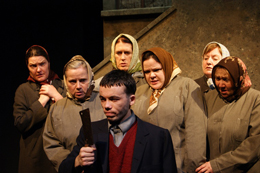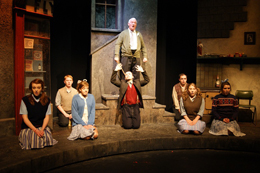Frank Pig Says Hello, Pat McCabe’s stage version of his acclaimed novel The Butcher Boy, first appeared as part of the 1992 Dublin Theatre Festival. Yet, overshadowed by Neil Jordan’s 1997 film adaptation of the novel, the play has rarely been revived since its premiere. This vibrant co-production by Galway Youth Theatre and Galway Arts Centre Community Drama resurrects and revitalises the forgotten play.
Originally, Frank Pig was staged as a two-hander. In the aftermath of the film’s success, director Andrew Flynn wanted to offer a different take on McCabe’s overlooked play. Working between the play and the book, Flynn developed the work into a large-scale, ensemble piece, featuring a blend of GYT’s young performers, along with more seasoned actors from Galway’s Community Theatre Network.
Flynn is a highly creative director. His penchant for interpreting and developing existing scripts in new ways is evident throughout his directorial repertoire, for example in GYT’s Yellow Moon and the Town Hall Theatre’s Tarry Flynn (both 2010). He applied this expertise to Frank Pig, expanding its performance possibilities and injecting it with his trademark style; like many of his past credits, this production was eclectic, theatrical, energetic and elaborate.
McCabe’s play offers two characterisations of Francie Brady: Piglet, the young Francie, and Frank, his aging counterpart who narrates the action. Flynn’s production opened on a cast of almost 30, aptly costumed by Petra Bhreatnach to evoke late 1950’s Ireland. The actors were gathered together centre stage, dimly-lit and appearing to be asleep. As Frank (Michael King) began to tell his tale, his dormant memories (embodied by the rest of the cast) awoke. Then, the stage became infused with life through music, brighter lights and bustling movement, taking us with Frank back to Piglet’s childhood. Mike O’Halloran’s lighting contributed to the story’s unfolding, bathing in gold nostalgic scenes of playing in the countryside and using more artificial, bluish hues for the Dublin night, for example.
 The Brady family are the underclass within a small Irish town, labelled as ‘pigs’ by Mrs Nugent who occupies the upper echelons of the community’s social hierarchy. With a mother oscillating between suicidal and manic behaviours, and an abusive, alcoholic father, the young Francie receives little nurture at home, seeking warmth instead through his friendship with Joe Purcell. However, Joe’s bourgeoning camaraderie with the Nugents’ son, Philip, complicates things for Francie. The functional, successful Nugent family becomes the focus of the protagonist’s adolescent rage. The Nugents represent everything that Francie has missed out on growing up, and he blames them for his alienation.
The Brady family are the underclass within a small Irish town, labelled as ‘pigs’ by Mrs Nugent who occupies the upper echelons of the community’s social hierarchy. With a mother oscillating between suicidal and manic behaviours, and an abusive, alcoholic father, the young Francie receives little nurture at home, seeking warmth instead through his friendship with Joe Purcell. However, Joe’s bourgeoning camaraderie with the Nugents’ son, Philip, complicates things for Francie. The functional, successful Nugent family becomes the focus of the protagonist’s adolescent rage. The Nugents represent everything that Francie has missed out on growing up, and he blames them for his alienation.
Jarlath Tivnan was ideal as Piglet. He embodied the various shades and subtle alterations in the young Francie’s personality, from his childlike innocence, humour and effervescent energy to his dangerous capacity to become unhinged. This was particularly evident in his interactions with the chorus of local women, whose laughter moved appropriately from hearty to nervous. On the other hand, King, as the adult Frank, appeared at times too wise and regretful; throughout the novel, the voice remains childlike, highlighting the character’s stunted development. Yet, since Francie has been institutionalised for many years when he tells us his story, King’s delivery could also be interpreted as drug-induced placation.
 The production was intricately-designed and made excellent use of the small space. Owen McCarthaigh’s set, with colourful scenic painting by Ger Sweeny, consisted of a selection of pieces representing such settings as the corner shop, the interior of Francie’s home, the exterior of another house, a train and an abattoir. The latter featured a realistic pig carcass which visually encapsulated the novel’s grotesque elements. The set pieces were placed close to the audience and to each other, remaining as a backdrop throughout performance. This had the effect of condensing into one all the scenes of Francie’s youth; they appeared garish, surreal and larger than life. Hence, the audience was invited to experience Francie’s distorted vision of reality. The cast’s live performance of songs also harmonised with the venue’s intimate spatial qualities—particularly for Uncle Alo’s visit, during which viewers were made to feel like attendees at a party in the Brady house.
The production was intricately-designed and made excellent use of the small space. Owen McCarthaigh’s set, with colourful scenic painting by Ger Sweeny, consisted of a selection of pieces representing such settings as the corner shop, the interior of Francie’s home, the exterior of another house, a train and an abattoir. The latter featured a realistic pig carcass which visually encapsulated the novel’s grotesque elements. The set pieces were placed close to the audience and to each other, remaining as a backdrop throughout performance. This had the effect of condensing into one all the scenes of Francie’s youth; they appeared garish, surreal and larger than life. Hence, the audience was invited to experience Francie’s distorted vision of reality. The cast’s live performance of songs also harmonised with the venue’s intimate spatial qualities—particularly for Uncle Alo’s visit, during which viewers were made to feel like attendees at a party in the Brady house.
Although this production of Frank Pig balanced vivacious entertainment with heart-wrenching sadness, it might have benefitted from some additional editing. Perhaps a little too much of the novel was included in the often very fast-paced first half. There was a lot to take in—especially if a viewer was unfamiliar with the book. The finale also could have been more in keeping with the tragedy of the tale. While Tivnan and King played versions of the same character, the physical presence of both actors on stage at the end slightly compromised the loneliness and solitude at the novel’s core.
That said, however, much of the production harnessed and elucidated the novel’s power to movingly consider such issues as the destructive impact of labelling, the necessity to protect children, the consequences of social tiers in small communities and cycles of mental illness that worsen through generations. Under Flynn’s direction, the show was filled with variety, showcasing the complementary, imaginative talents of a host of performers and designers. As such, it merited the standing ovation that it received.
Siobhán O’Gorman teaches at the National University of Ireland, Galway, where she has just completed her doctorate in contemporary theatre.